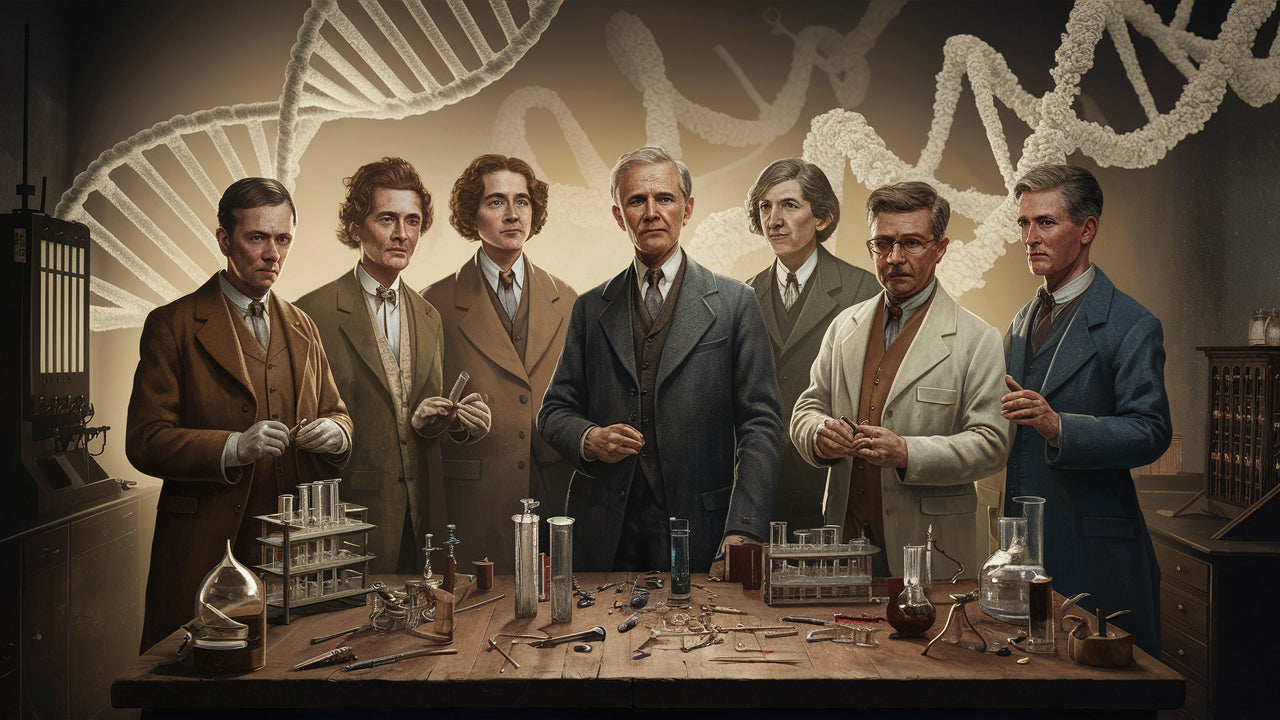The RNA pioneers
The story of RNA is a fascinating journey through the annals of scientific discovery, marked by the contributions of brilliant minds who have shaped our understanding of genetics and molecular biology. From the early pioneers who first isolated nucleic acids to the modern-day researchers unraveling the complexities of RNA, these individuals have left an indelible mark on science. Let’s meet some of these remarkable figures and explore their groundbreaking work and unique personalities who we call Genomic Pioneers in the field of RNA.
Pioneers and Early Explorers (1800s-Early 1900s)
Friedrich Miescher (1844-1895)
Contribution: Isolated “nuclein” (later known as nucleic acids) from white blood cells.
Fun Tidbit: Miescher’s discovery was made in a makeshift lab in a castle kitchen!
Albrecht Kossel (1853-1927)
Contribution: Identified the five primary nucleobases found in nucleic acids.
Fun Tidbit: Kossel was known for his love of music and often played the piano to relax.
Phoebus Levene (1869-1940)
Contribution: Distinguished RNA from DNA by identifying ribose as a key component of RNA.
Fun Tidbit: Levene was a polyglot, fluent in several languages including Russian, German, and English.
Deciphering the Genetic Code and RNA Synthesis (1950s-1960s)
Severo Ochoa (1905-1993)
Contribution: Synthesized RNA in the lab.
Fun Tidbit: Ochoa was an avid chess player and often used chess analogies to explain scientific concepts.
Arthur Kornberg (1918-2007)
Contribution: Isolated DNA polymerase.
Fun Tidbit: Kornberg had a passion for photography and documented his travels and scientific conferences.
Robert Holley (1922-1993)
Contribution: Determined the structure of tRNA.
Fun Tidbit: Holley was a farmer before becoming a scientist and often used his agricultural knowledge in his research.
Har Gobind Khorana (1922-2011)
Contribution: Synthesized RNA with defined sequences, aiding in the deciphering of the genetic code.
Fun Tidbit: Khorana loved to cook and often hosted elaborate dinner parties for his colleagues.
Marshall Nirenberg (1927-2010)
Contribution: Cracked the genetic code.
Fun Tidbit: Nirenberg was a passionate birdwatcher and often went on birdwatching trips to unwind.
Expanding the RNA World (1970s-1990s)
Carl Woese (1928-2012)
Contribution: Used rRNA analysis to propose the three-domain system of life.
Fun Tidbit: Woese was known for his unconventional thinking and often worked late into the night, fueled by coffee.
Sydney Brenner (1927-2019)
Contribution: mRNA.
Fun Tidbit: Brenner had a quirky sense of humor and loved to tell jokes during his lectures.
François Jacob (1920-2013)
Contribution: Contributed to the discovery of mRNA and gene regulation.
Fun Tidbit: Jacob was a decorated war hero, having served in the French Resistance during World War II.
Matthew Meselson (1930-present)
Contribution: Helped discover mRNA and developed techniques for studying DNA replication.
Fun Tidbit: Meselson is an avid scuba diver and has explored many underwater ecosystems.
Joan Steitz (1941-present)
Contribution: snRNAs and their role in RNA splicing.
Fun Tidbit: Steitz is known for her love of gardening and often compares the complexity of RNA to the intricacies of plant life.
Thomas R. Cech (1947-present)
Contribution: RNA can act as an enzyme (ribozyme).
Fun Tidbit: Cech enjoys hiking and often finds inspiration for his research during long walks in nature.
Sydney Altman (1939-present)
Contribution: The catalytic properties of RNA.
Fun Tidbit: Altman is a talented pianist and often plays classical music to relax.
Victor Ambros (1953-present)
Contribution: microRNAs (miRNAs) and their role in gene regulation.
Fun Tidbit: Ambros is a fan of science fiction and often draws parallels between his research and futuristic concepts.
Gary Ruvkun (1952-present)
Contribution: miRNAs along with Ambros.
Fun Tidbit: Ruvkun is an enthusiastic sailor and spends his free time navigating the seas.
Elizabeth Blackburn (1948-present)
Contribution: The structure of telomeres and telomerase.
Fun Tidbit: Blackburn is a keen swimmer and often starts her day with a swim to clear her mind.
Carol Greider (1961-present)
Contribution: Telomerase and its role in maintaining telomeres.
Fun Tidbit: Greider is an accomplished marathon runner and has completed several marathons around the world.
The Modern RNA Era (2000s-Present)
John Rinn (1977-present)
Contribution: Leading researcher in the field of long non-coding RNAs (lncRNAs).
Fun Tidbit: Rinn is a passionate rock climber and often scales challenging cliffs in his free time.
Howard Chang (1973-present)
Contribution: Pioneer in lncRNA research, focusing on their role in development and disease.
Fun Tidbit: Chang is an amateur chef and loves experimenting with molecular gastronomy.
Craig Mello (1960-present)
Contribution: RNA interference (RNAi).
Fun Tidbit: Mello is an avid cyclist and often participates in long-distance cycling events.
Andrew Fire (1959-present)
Contribution: Shared the Nobel Prize with Mello for the discovery of RNAi.
Fun Tidbit: Fire enjoys playing the guitar and often performs at local music events.
Jennifer Doudna (1964-present)
Contribution: Pioneer in CRISPR-Cas9 technology.
Fun Tidbit: Doudna is a fan of mystery novels and often reads them to unwind after a long day in the lab.
Emmanuelle Charpentier (1968-present)
Contribution: The CRISPR-Cas9 system with Doudna.
Fun Tidbit: Charpentier loves to travel and has visited over 50 countries, often combining her trips with scientific conferences.
Phillip Sharp (1944-present)
Contribution: RNA splicing and split genes.
Fun Tidbit: Sharp is an enthusiastic gardener and has a beautiful collection of rare orchids.
Richard Roberts (1943-present)
Contribution: Split genes and RNA splicing.
Fun Tidbit: Roberts is a passionate stamp collector and has an extensive collection from around the world.
For more detailed information, you can refer to the blog on MapmyGenome: RNA: The Unsung Heroes of Your Cells.







